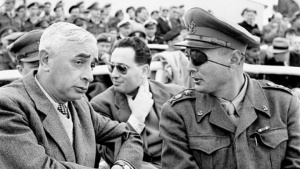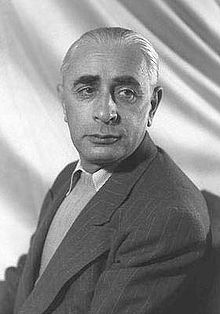Lavon Affair
 Chief of Staff Moshe Dayan (right), Defense Ministry director general Shimon Peres (in back) and Defense Minister Pinhas Lavon at an officers' course graduation ceremony, 1954. | |
| Date | July 1954 - Oct 1954 |
|---|---|
| Location | Egypt |
| Perpetrators | Mossad |
| Blamed on | Egypt |
| Description | A false flag bombing campaign carried out in Egypt against US, UK and Egyptian targets. Israel was caught and exposed - and officially admitted responsibility some 51 years later. |
The Lavon Affair refers to a failed Israeli false flag operation conducted in Egypt in the Summer of 1954. A group of Egyptian Jews were recruited by Israeli military intelligence to plant bombs inside Egyptian, American and British-owned targets.
The exact motive is unclear, but Israel was making great efforts to induce more Jews to make aliyah, so inciting hatred of the Jews helped populate their new and deserted lands. Israel also wished to induce the British government to retain its occupying troops in Egypt's Suez Canal zone and may have wanted to make Egypt appear to be either divided and unstable, or anti-Western/communist/pro-Russian.
Israel finally admitted the attack 51 years later in 2005. It completely escaped any blame in the West[citation needed] and 2 years later, the UK joined it in the attack known as the Suez Affair. However, the use of native Jews as fifth-columnists and terrorists contributed to a wave of antisemitism and expulsions in Egypt and other parts of the Middle East.[citation needed]
Contents
Lavon Bombings
Nine (or thirteen) Jews of Egyptian nationality were arrested in Oct 1954 after one of their number was caught red-handed in a terrorist campaign.[1] Israeli agents "recruited nine young Egyptian Jews to stage terrorist attacks that, they thought, would be blamed on local insurgents and would discredit Nasser's rule" (Jewish Review, 2004.[2]) Two named individuals served 7 year sentences in Egypt, five of them served 13 years in Egyptian prisons and two committed suicide.
While there were no deaths from the bombs placed in the Egyptian, US and UK facilities in Alexandria and Cairo, the consequences for internal Israeli politics and the situation of Jews in Egypt were grave. Pinhas Lavon was wrongly blamed and forced to resign and the innocent Prime Minister Moshe Sharrat was replaced by one of the perpetrators, David Ben-Gurion. Ben-Gurion went on to conceive and carry out a number of wanton provocations and killings, including the 1956 attack on Suez, the mass-killing of Egyptian POWs and the first major destruction in Gaza. Six years later, a secret internal inquiry led to David Ben-Gurion's resignation but Sharret and Lavon's reputations were never officially cleared.
Fuller details from a Zionist perspective appear at the Wikipedia Lavon Affair. The affair is described as "disastrous for Israel in several ways" but fail to mention any of the very serious effects on Egypt or Egyptian Jews. Factually, the Wikipedia article is detailed and largely complete. The Wikipedia article on False Flag is mysteriously thin, perhaps because Israel has denied or accused others of so many attacks. The article has just a one-line mention for the Lavon affair and no mention of what such incidents might have in common.
Acknowledgement by Israel
One of the perpetrators who had committed suicide was re-interred with military honour but no publicity on Mount Herzl in 1959.[3]
On March 30, 2005 Israeli President Moshe Katsav.[4] and Chief of General Staff Lieutenant General Moshe Ya’alon ended decades of denial by presenting official citations to the three surviving agents and to representatives of those deceased, saying: "This is historic justice for those who were sent on a mission on behalf of the state and became the victims of a complex political affair."[5][6]
Israeli Motives
After WW2, a much impoverished Britain was withdrawing from all of its interests "East of Suez" (India independence 1948 etc). It was preparing to give up the giant military base it had in the Suez Canal Zone while Bengurion and Eisenhower had been unable to persuade even a Conservative government under Winston Churchill not to do so. The head of Israeli intelligence, Colonel Benyamin Givli, ordered an Egyptian spy-ring into action. He did so without Lavon or Sharret knowing anything about it.
It is easy to assume that Israel sought to cause strife between Egypt and the West but historians have largely accepted that the aim was to destabilise Egypt. The Israeli historian Shabtai Teveth goes further in his detailed coverage "Ben-Gurion's Spy" (1996) p.81 and states that the aim was to help the British and strengthen Egyptian opponents of withdrawal from the Suez Canal area. It was aimed at "generating public insecurity and actions to bring about arrests, demonstrations, and acts of revenge, while totally concealing the Israeli factor. The team was accordingly urged to avoid detection, so that suspicion would fall on the Muslim Brotherhood, the Communists, 'unspecified malcontents' or 'local nationalists'."[7][8]
Consequences
Israeli Benefit
Israel suffered no adverse public relations consequences in the west, while generating significant antisemitism in Egypt and elsewhere in the region. This hatred was of great assistance to Zionist efforts to ingather Jews needed to work in the fields and to protect the new borders of Israel (far beyond what had been claimed in the Declaration of Independence).
Prime Minister Moshe Sharett denounced "the show trial which is being organized there against a group of Jews who have fallen victims to false accusations". The trade union newspaper Davar claimed that the Egyptian regime "seems to take its inspiration from the Nazis" and lamented the "deterioration in the status of Egyptian Jews in general" For Haaretz the trial "proved that the Egyptian rulers do not hesitate to invent the most fantastic accusations if it suits them" and added that "in the present state of affairs in Egypt the junta certainly needs some diversion". The Jerusalem Post headlined "Egypt Show Trial Arouses Israel, Sharett Tells House. Sees Inquisition Practices Revived."[9]
Egyptian Jews with skills and contacts did their best to get to Europe or the US, those with only manual skills (often brown-skinned and speaking no Hebrew) were put to work in the fields. An additional part of their duty was to be armed and to kill any Palestinians attempting to return to their homes and lands.
Jews in Egypt suffer
In July 1954, when the bombings started, there were still at least 50,000 Jews in Egypt (more than half of whom were actually foreign nationals)[10] despite mob and bombing attacks (eg 70 killed in bombings between June and Nov 1948[11]) over the creation of Israel (and the defeat of the Egyptian forces). This, and the revolutionary upheaval four years later (eg eg in Jan 1951 mobs had rampaged through downtown Cairo setting fires and killing scores of people, including thirteen Britons) had caused around 10,000 Jews to leave (though few went to Israel). A Jewish journalist insisted: "We, Egyptian Jews, feel secure in our homeland, Egypt".[12]
In 1956, Israel again attacked Egypt (very shortly joined by the UK and France in the "Suez Affair") and, as discovered in 1995, murdering captured soldiers and at least 49 civilians.[1] Egypt thereupon expelled some 25,000 more Egyptian Jews and confiscated their property, while approximately 1,000 Jews were sent to prisons and detention camps.[13]
Zionist Nomenclature
Despite the fact that it had caused a major and continuing scandal, Israeli military censorship applied to all the details of the "Lavon Affair" and, on the rare occasions it was mentioned in Israel in the years to follow it was called "Operation Susannah" or the "unfortunate business".[14] The attacks are still known in English by the Zionist narrative, the "Lavon Affair" with little recognition that this was a quite straightforward terrorist campaign aimed at the US and the UK.
Zionist sympathisers at the Wikipedia have been hostile to calling it a False Flag Operation and all such references have been repeatedly removed from the WP again in June 2011 (a top admin and personal friend of Jimbo Wales) and Jan 2012. However, the term is used by ex-Knesset member Uri Avnery in his writings[15] [16] and is used in the book "Global Terrorism", 2004.[17] Some Israeli sources have claimed that the fire-bombing was an "Intelligence Operation" rather than an attack.
External Links
- Declassified documents shed light on Lavon Affair that rocked Israel - Israel Hayom 12 May 2015
References
- ↑ The Lavon Affair, p.289, David Hirst, The Gun and the Olive Branch, 1977, 1984, Futura Publications
- ↑ Jewish Review: "recruited nine young Egyptian Jews to stage terrorist attacks that, they thought, would be blamed on local insurgents and would discredit Nasser's rule" 2004.
- ↑ Meir Max Bineth - Dedicated to his memory re-interred in the Mount Herzl military cemetery in Jerusalem in 1959. Hebrew with some English. MeirMaxBineth.org
- ↑ "After half a century of reticence and recrimination, Israel ... honored ... agents-provocateur." YNetNews, 30th March 2005.
- ↑ "Egyptian-Jewish Spy Ring Gets Belated Salute" "Fifty years after an Egyptian court convicted them of being Zionist agents, and 37 years after their release from Egyptian prisons, Marcelle Ninio [aka Victorin Ninyo], Robert Dassa and Meir Zafran were accorded military ranks Wednesday in recognition of their service to the state and their years of suffering. "Ninio and Dassa were promoted to lieutenant-colonel (res.) and Zafran to major (res.) in the Israel Defense Forces." "This is historic justice for those who were sent on a mission on behalf of the state and became the victims of a complex political affair." Jerusalem Post March 31, 2005.
- ↑ "Israel Honors Egyptian Spies 50 Years After Fiasco" Reuters in Ha’aretz, archived by "If Americans Knew" March 30, 2005.
- ↑ Teveth, Shabtai Ben-Gurion's Spy "suspicion would fall on the Muslim Brotherhood, the Communists, 'unspecified malcontents' or 'local nationalists'" not on the Egyptian regime. Columbia University Press, 1996, p.81.
- ↑ Hirst, David The Gun and the Olive Branch "generally assumed that they were the work of the Moslem Brothers, then the most dangerous challenge to the still uncertain authority of Colonel (later President) Nasser and his two-year-old revolution" p.20.
- ↑ Hirst, David The Gun and the Olive Branch Prime Minister Moshe Sharett denounced: "a group of Jews who have fallen victims to false accusations" p.289.
- ↑ Hirst p.290
- ↑ Howard Sachar A History of Israel NY: Alfred A. Knopf, 1979, p. 401. "Between June and November 1948, bombs set off in the Jewish Quarter of Cairo killed more than 70 Jews" cited [http://www.jewishvirtuallibrary.org/jsource/anti-semitism/egjews.html The Jews of Egypt By Mitchell Bard] JVL, updated 2007.
- ↑ Berger, Elmer Who Knows Better Must Say So Institute for Palestine Studies, Beirut, p. 14. cited Hirst p.290.
- ↑ 1956 - Egypt expelled almost 25,000 Egyptian Jews and confiscated their property, while approximately 1,000 Jews were sent to prisons Jewish Virtual Library. updated 2007.
- ↑ Teveth, Shabtai Moshe Dayan. The soldier, the man, the legend was written 20 years later and refers to the Lavon Affair as the "unfortunate business". Quartet Books, 1974, p.265
- ↑ the army carried out a false-flag sabotage campaign against US and British targets in Egypt designed to cause strife between Egypt and the West. Uri Avnery, Zmag.
- ↑ Haolam Hazeh ... an Israeli false flag operation in Egypt Uri Avnery, Gush-Shalom.
- ↑ Israel even used 'false flag' operations "In 1954 sympathetic Jews in Egypt used bombs and arson against US installations. The objective was for local Arab..." Global Terrorism James and Brenda Lutz, 2004.
